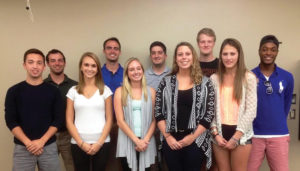ALEXANDRIA NIEVES
Special to The Leader
The Fredonia business club has created a new program to help out nonprofit organizations in the surrounding community.
The Adopt-a-Non-Profit Program was formed as a way for the club to gain hands-on experience in coordination with a non-profit from the area.
For their first year, the club chose to help out the Lakeshore Humane Society in hopes of improving their organization in areas such as the organization’s finances, inventory, policies, environmental impact and volunteer recruiting.
“We looked at a bunch of non-profit organizations and we ended up picking the Lakeshore Humane Society, and so we’re taking a bunch of our general body members, splitting up into groups based on what the Humane Society needs to improve on, and we work in our groups using what we’ve learned in school, as business majors,” said Molly Gibbs, business club president.
The Lakeshore Humane Society is a non-profit, all volunteer, no-kill animal shelter located in Dunkirk.
[RELATED: Pause what you’re doing: Interactive Theater Society hosts annual Applause for Paws]
They were established in 1980 and have since grown, expanding their services to the entire north end of Chautauqua County.
“When Lakeshore Humane Society started out, they were doing rescues out of somebody’s garage, and now we have a physical building in which we’ve probably held 500-plus animals a year,” said Jennifer Cameron, treasurer of Lakeshore Humane Society.
Cameron not only puts her time into the routine tasks of a treasurer for Lakeshore, but is also a cat cleaner once a week, runs the organization’s fundraiser “Fur Ball,” and teaches as an adjunct professor in economics at Fredonia.
She has been with Lakeshore for four years now.
“With [Lakeshore’s] growth, we are held to some rules and regulations and are trying to be consistent, and you know, it’s all volunteer run, so it means nobody’s paid on staff,” said Cameron.
When the business club approached her with the idea of taking on Lakeshore for the Adopt-a-Non-Profit, she coordinated with the group on what she thought had to be worked on on most for the organization.
“It’s got to be a beneficial relationship for the students and for the non-profit,” said Cameron. “So I kind of looked at ‘where are some areas we need help with,’ and asked if the students would be interested in helping with those things.”
When it came down to choosing which non-profit they wanted to help, the club wanted to choose a place that everyone felt good about dedicating their time to.
“We wanted to pick something we were all passionate about,” said Gibbs. “We’ve met for the past three Sundays, we’re meeting again next week and it’s been three hours each time, and we also each do an hour during the week of our own time. So, picking something that we’re passionate about and want to be working on makes it so much easier to devote time into every week.”
Throughout the three weeks they’ve begun working with the organization, they have established groups within their club, each working on the different aspects of business for Lakeshore.
“Our go-green group is working on making Lakeshore more sustainable and environmentally friendly,” said Gibbs. “Another group is our finance/inventory group, who are going through and seeing what [Lakeshore] could be spending money on and helping with the inventory system at the organizations boutique.”
“The last two groups are marketing, who are working on volunteer recruiting, due to the organization’s need for younger volunteers, and finally the policy group, who are creating policies for the area’s that the organization doesn’t already have any, like fundraising.”
At the end of the semester, once the business club has applied their skills to the Humane Society, they will present their entire process to the organization’s board of directors to decide whether or not to move forward with the changes.
“Ultimately, it is up to the board of directors to decide whether we adapt or not, but all ideas are great, so we will take that into great consideration,” said Cameron.
The business club will also be presenting their work at the regional level, competing in the Community Service Project on March 28.
“We are required to prepare a 15-page report describing all of our work throughout this program,” said Emily Johnson, business club secretary and Phi Beta Lambda chair. “We will then defend our report, and we will present the content and answer any questions from the judges.
“Our presentation team is made up of Jason Opferbeck, Molly Gibbs and myself.”
The club will be competing against other chapters throughout the state who have performed a project and completed the same requirements.
If the club places in the top two, they will have the opportunity to move on and present at the National Leadership Conference against chapters from all across the United States.
“It is our hope, with how active we have been throughout this process, that we will place well at the upcoming conference,” said Johnson. “Based on my past experience with competitions, I feel that if our team continues to work as well as we have, we can move on to the National Competition this summer.”
As of right now, the business club’s Adopt-a-Non-Profit Program has great potential not only for Fredonia students, but for the non-profits in the community as well.
The program is more than likely something the business club sees themselves continuing throughout the years to come.
“Anything that goes well we definitely want to do again, and this is going really well so far and there’s a bunch of places that could use our help,” said Gibbs.
